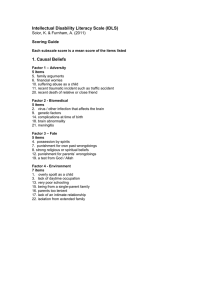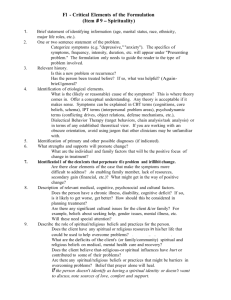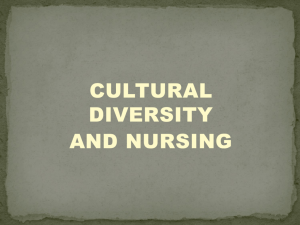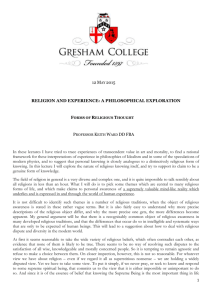Questions you can ask to understand the beliefs
advertisement
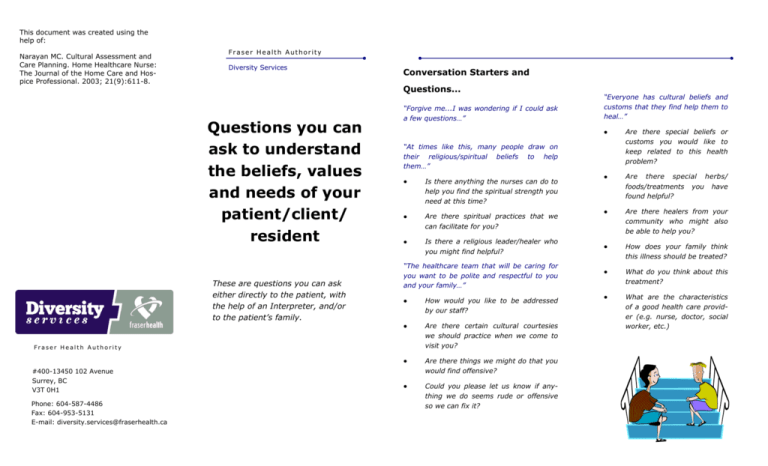
This document was created using the help of: Narayan MC. Cultural Assessment and Care Planning. Home Healthcare Nurse: The Journal of the Home Care and Hospice Professional. 2003; 21(9):611-8. Fraser Health Authority Diversity Services Questions... Questions you can ask to understand the beliefs, values and needs of your patient/client/ resident These are questions you can ask either directly to the patient, with the help of an Interpreter, and/or to the patient’s family. Fraser Health Authority #400-13450 102 Avenue Surrey, BC V3T 0H1 Phone: 604-587-4486 Fax: 604-953-5131 E-mail: diversity.services@fraserhealth.ca Conversation Starters and “Forgive me...I was wondering if I could ask a few questions…” “At times like this, many people draw on their religious/spiritual beliefs to help them…” Is there anything the nurses can do to help you find the spiritual strength you need at this time? Are there spiritual practices that we can facilitate for you? Is there a religious leader/healer who you might find helpful? “The healthcare team that will be caring for you want to be polite and respectful to you and your family…” How would you like to be addressed by our staff? Are there certain cultural courtesies we should practice when we come to visit you? Are there things we might do that you would find offensive? Could you please let us know if anything we do seems rude or offensive so we can fix it? “Everyone has cultural beliefs and customs that they find help them to heal…” Are there special beliefs or customs you would like to keep related to this health problem? Are there special herbs/ foods/treatments you have found helpful? Are there healers from your community who might also be able to help you? How does your family think this illness should be treated? What do you think about this treatment? What are the characteristics of a good health care provider (e.g. nurse, doctor, social worker, etc.) Questions you can ask to understand your patient’s/client’s/resident’s beliefs, values and needs... Language and Communication “What language are you most comfortable speaking?” “There are trained medical interpreters available and we recommend our patients use them instead of family members or friends. Would you like an interpreter?” Is the patient able to read in English or their preferred language? “What language are you most comfortable reading in?” Life Span Rituals/Practices “What beliefs, values, and practices surround life events?” (E.g. birth, childcare, aging, death. Ask as appropriate to the patient’s situation). Patient’s Explanation of Health Problem Does the patient tend to be stoic or expressive when in pain? “What does pain mean to you?” “Are there religious food prescriptions and restrictions that you might follow?” “When and how did your problem begin?” “Why do you think the problem started when it did?” Is pain generally described in quantitative or qualitative terms? Ask yourself: Is there potential food/ drug interaction with traditional foods? “What do you think caused this problem?” “Why do you think you developed this problem and not someone else? “ “What might others in your family/ community think is the problem?” “What is your attitude about taking pain medications?” or “How do you feel about taking pain medications?” “Do you know someone who has had this problem?” “What happened to that person?” “Do you think this will happen to you?” “What are the chief problems this condition has caused you?” “What problems has it brought into your life?” “What do you think will happen?” “What does a “good” birth, death, etc. look like?” (Ask as appropriate to the patient’s situation). “What do you fear most about the problem?” “How serious is this problem?” “Do you think it is curable?” “Are there spiritual practices that healthcare providers can help you keep?” ((e.g. special prayer times) “Are there religious articles that you would like to use, wear or keep close?” “Are there special rites/blessings for the sick?” “Are there any spiritual leaders/ healers that you will find helpful?” “Are there dietary prescriptions or restrictions that you follow?” “What foods are thought to promote health?” “What foods are considered good for sick people?” “What do you call the problem you are having?” (Use the patient’s term instead of “the problem” when asking the rest of the questions.) If the patient has a terminal disease, should one “tell the truth” or “maintain hope”? Religious/Spiritual Needs Pain Assessment “How have you treated the problem so far?” “What have you done to feel better?” “Have you tried remedies like herbs or remedies from your homeland?” “How do you/your family/your community members think the problem should be treated?” “Who in your family/ community/religious group can help you?” “Are you consulting with other healers?” “Is the numerical scale confusing?” “What is the worst pain you have ever had?” “How did you cope with it?” “How did you treat it?” “How well did the treatment work?” Daily (Health) Practices and Routines “Are there special rituals/practices associated with bathing, toileting, hair and/or nail care?” Are there gender/age/social class restrictions on who can help a person with activities for daily living? Ask: “Who would you prefer help you with your daily activities?” “Are there special morning/evening rituals or practices that are important to you?” Nutritional Assessment Perform a 2-day diet recall “What have you eaten in the last two days? What times did you eat?” Ask yourself: Are there dietary patterns that may be in conflict with the plan of care (e.g. fasting)? Questions in Regards to Family/Support “Who is considered “family” for you?” “What impact does the illness have on your family?” “With whom should we discuss your care?” “Would you like someone to help you in decision-making?” If so, “Who would you like to help?” If the patient chooses two or more people, ask the following: “If these people disagree, how would you like it resolved?” “How would you like your family members to be involved in your care?” “Who helps you when you are sick?” “How do they help you?” “How would you like them to help you?” What health/support services are available through the patient’s cultural community? (You may need to ask a Social Worker, family member or Diversity Services) “Who will be primarily taking care of you when you leave the health facility?“ “Where will you live?”
